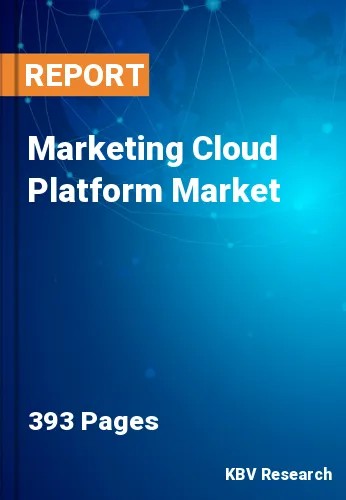The Global Marketing Cloud Platform Market size is expected to reach $18 billion by 2028, rising at a market growth of 8.0% CAGR during the forecast period.
The marketing Cloud platform provides relevant, personalized journeys across channels and devices, enabling marketers to deliver the appropriate message at the appropriate moment across all phases of the relationship. Marketing Cloud provides tools for customer experience management, mobile, email, social, site personalization, advertising, content production, managerial staff, and data analysis. Covering every possible customer touch and engagement, and guiding consumers on their 1-to-1 journeys with business has never been simpler or more effective.
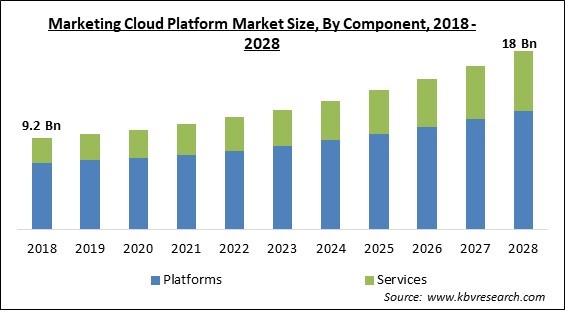
Marketing clouds are a set of marketing solutions that are all delivered via the cloud and allow marketers to manage client interactions and marketing campaigns more. Marketing cloud platforms are aimed to simplify real-time monitoring, planning, and decision-making as part of the broader trend toward marketing automation. As expected, a marketing cloud offers a complete digital marketing platform with a wide range of features and solutions.
Social media, content production, web personalization, content management, data analysis, and advertising are included. The purpose of a cloud platform is to handle marketing efforts more. With the marketing cloud, businesses can furthermore employ event-driven triggers to set in motion particular responses to consumer behaviors.
For instance, if a customer enrolls in a loyalty program, marketing clouds can automatically send each of them thank-you letters via push notifications. The overall objective of the marketing cloud is to enable marketers to develop cohesive multiple-channel experiences, reaching custom through the proper channels – including SMS, social media, MMS, and messaging (along with group messaging) – at the appropriate moments, thereby increasing sales and revenue.
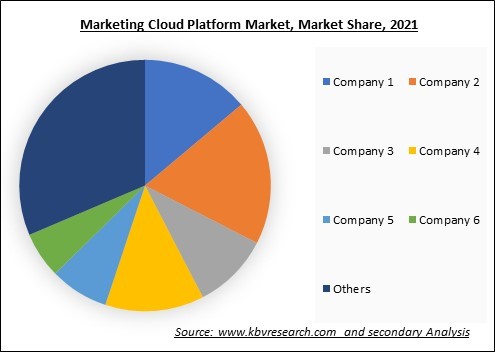
The leading players in the market are competing with diverse innovative offerings to remain competitive in the market. The below illustration shows the percentage of revenue shared by some of the leading companies in the market. The leading players of the market are adopting various strategies in order to cater demand coming from the different industries. The key developmental strategies in the market are Acquisitions, and Product Launches.
COVID-19 has had a substantial effect on the company's competitiveness due to the restrictions placed on communications with current and potential customers. In any industry, the customer is the major focus of enterprises. Consequently, businesses will gain from the relationships that marketers have created with their clients over time throughout the COVID-19 pandemic. The marketing cloud platform enables organizations to evaluate client interactions all through the lifecycle of a product or consumer. The pandemic has compelled organizations to rely increasingly on advertising cloud platforms to rethink corporate operations, customer relationships, and marketing strategies. During the pandemic, both individuals and businesses turned toward automated systems and were dependent on cloud-based technology, increasing in demand for marketing cloud platform services.
The customer data platform (CDP) enables marketers to provide uniform customer experiences through websites, email, mobile, social media, advertising, and offline channels. By creating a consistent, tailored omnichannel experience, marketers can keep customers engaged and moving forward toward their journeys. A platform with extensibility can develop and evolve to meet the market's demands without having to be completely rewritten. A flexible platform makes it easy to incorporate new products and services to accommodate fluctuating demands across several platforms.
Virtual Reality (VR) and Augmented Reality (AR) have been widely adopted in the gaming sector, and these cutting-edge technologies are currently being utilized in digital marketing to increase company. Vertical industries, such as media, entertainment, gaming; retail; and education, are deliberately investing in and integrating VR and AR technologies to enhance customer experiences. AR combines the actual and digital worlds by superimposing a digitally generated overlay onto the current environment, whereas VR refers to an entirely digital reality. Creating a lasting impression, campaigns utilizing AR and VR technology provide the audience with a greater sense of the products and services.
It is known as vendor lock-in when a customer's commitment to a single service supplier makes switching practically impossible. Consequently, the client's reliance on the service supplier increases. Lock-in is an issue with cloud marketing platforms. This dependency emerges as a result of the effort required to switch providers, which may make this a poor option or seem impossible. Vendor lock-in happens when a single vendor dominates the technology, binding the consumer to that company.
Based on the Component, the Marketing Cloud Platform Market is segmented into Platforms and Services. The platforms segment acquired the highest revenue share in the marketing cloud platform market in 2021. A combination of marketing technology that marketers can access over the web, as opposed to on-premise solutions. Typically, a cloud marketing platform will contain tools for managing programs, creating content, scheduling tasks, engaging customers through social networks, and managing analytics and reporting to optimize marketing efforts.
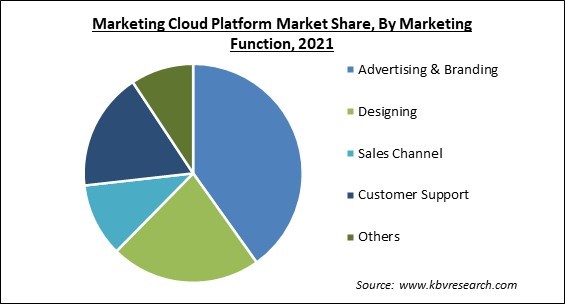
On the basis of Platforms Type, the Marketing Cloud Platform Market is divided into Customer Relationship Management, Software-as-a-Service, and Business-to-Business. The software-as-a-service segment procured the largest revenue share in the marketing cloud platform market in 2021. SaaS is considered part of cloud computing. It is because users often access SaaS applications using a thin client, such as a web browser. SaaS has become a prevalent delivery model for numerous business applications, such as office applications, messaging software, payroll management software, DBMS software, management software.
On the basis of Marketing Function, the Marketing Cloud Platform Market is segmented into Advertising & branding, Designing, Sales Channels, and Customer Support and others. The customer support segment recorded a significant revenue share in the marketing cloud platform market in 2021. Customer support is a collection of services designed to aid customers in the efficient and proper usage of a product. It consists of assistance with product planning, implementation, teaching, troubleshooting, upkeep, upgrading, and disposal.
Based on the Deployment Mode, the Marketing Cloud Platform Market is bifurcated into Public Cloud and Private Cloud. The public cloud segment acquired the largest revenue share in the marketing cloud platform market in 2021. Public Cloud is an information technology approach in which on-demand computing resources and infrastructure are maintained by a third-party provider and shared with many companies over the Internet.
By Organization Size, the Marketing Cloud Platform Market is classified into Large Enterprises and SMEs. The SMEs segment registered a significant revenue share in the marketing cloud platform market in 2021. It is because it provides excellent automation tools for small enterprises. Salesforce's pricing is accessible to nearly everyone and may be utilized to launch a small business. Salesforce propels businesses to new heights and provides new areas for exploration.
Based on the Verticals, the Marketing Cloud Platform Market is bifurcated into Retail & eCommerce, Banking, Financial Services, & Insurance (BFSI), IT & Telecom, Education, Travel & Hospitality, Media, Entertainment, & Gaming, Healthcare & Life Sciences, and Other. The media, entertainment, and gaming segment witnessed a promising growth rate in the marketing cloud platform market in 2021. The media, entertainment, and gaming industry have experienced a transition to adapt their business operations and how content is created, controlled, and distributed to the digital era.
| Report Attribute | Details |
|---|---|
| Market size value in 2021 | USD 10.6 Billion |
| Market size forecast in 2028 | USD 18 Billion |
| Base Year | 2021 |
| Historical Period | 2018 to 2020 |
| Forecast Period | 2022 to 2028 |
| Revenue Growth Rate | CAGR of 8% from 2022 to 2028 |
| Number of Pages | 393 |
| Number of Tables | 663 |
| Report coverage | Market Trends, Revenue Estimation and Forecast, Segmentation Analysis, Regional and Country Breakdown, Market Share Analysis, Competitive Landscape, Companies Strategic Developments, Company Profiling |
| Segments covered | Component, Deployment, Marketing Function, Organization Size, Vertical, Region |
| Country scope | US, Canada, Mexico, Germany, UK, France, Russia, Spain, Italy, China, Japan, India, South Korea, Singapore, Malaysia, Brazil, Argentina, UAE, Saudi Arabia, South Africa, Nigeria |
| Growth Drivers |
|
| Restraints |
|
Region-wise, the Marketing Cloud Platform Market is analyzed across North America, Europe, Asia Pacific, and LAMEA. The North America segment acquired the highest revenue share in the marketing cloud platform market in 2021. It is because North American nations such as the United States and Canada have a robust economic landscape, enormous IT budgets, high technology assimilation, and early adoption of advanced technologies such as artificial intelligence, machine learning, cybersecurity, data analytics, and blockchain, all of which are anticipated to increase the demand for marketing cloud platforms among North American businesses.
Free Valuable Insights: Global Marketing Cloud Platform Market size to reach USD 18 Billion by 2028
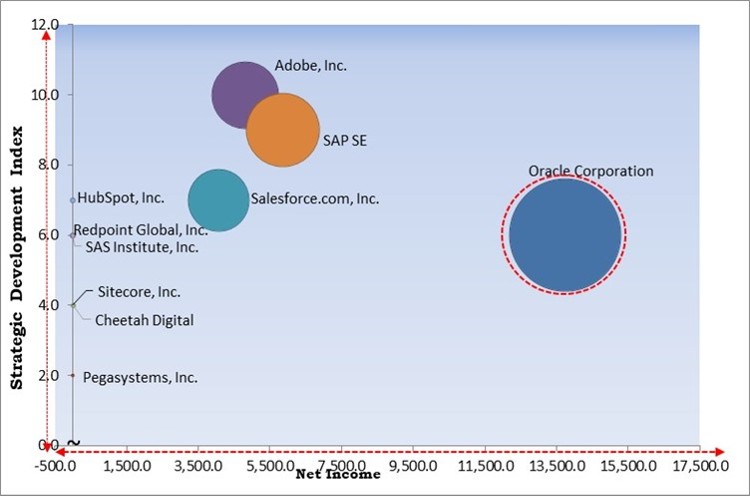
The major strategies followed by the market participants are Acquisitions and Product Launches. Based on the Analysis presented in the Cardinal matrix; Oracle Corporation is the major forerunners in the Marketing Cloud Platform Market. Companies such as Adobe, Inc., Salesforce.com, Inc., SAP SE are some of the key innovators in Marketing Cloud Platform Market.
The market research report covers the analysis of key stake holders of the market. Key companies profiled in the report include Adobe, Inc., Salesforce.com, Inc., Oracle Corporation, Pegasystems, Inc., HubSpot, Inc., SAP SE, SAS Institute, Inc., Redpoint Global, Inc., Cheetah Digital and Sitecore, Inc.
By Component
By Marketing Function
By Deployment Mode
By Organization Size
By Vertical
By Geography
The Marketing Cloud Platform Market size is projected to reach USD 18 billion by 2028.
Augmentation of The Consumer Data Platform to Enhance the Marketing Experience are driving the market in coming years, however, Increased Lock-In of Vendors restraints the growth of the market.
Adobe, Inc., Salesforce.com, Inc., Oracle Corporation, Pegasystems, Inc., HubSpot, Inc., SAP SE, SAS Institute, Inc., Redpoint Global, Inc., Cheetah Digital and Sitecore, Inc.
The expected CAGR of the Marketing Cloud Platform Market is 8.0% from 2022 to 2028.
The Advertising & Branding market acquired maximum revenue share in the Global Marketing Cloud Platform Market by Marketing Function in 2021; thereby, achieving a market value of $6.9 billion by 2028.
The North America market dominated the Global Marketing Cloud Platform Market by Region in 2021; thereby, achieving a market value of $6.1 billion by 2028.
Our team of dedicated experts can provide you with attractive expansion opportunities for your business.
